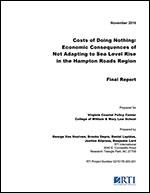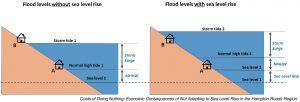 Recent studies have pointed out the economic costs of rising temperatures, increased sea levels, and extreme weather events — all factors associated with climate change impact in the Southeast United States.
Recent studies have pointed out the economic costs of rising temperatures, increased sea levels, and extreme weather events — all factors associated with climate change impact in the Southeast United States.
Costs of Doing Nothing: Economic Consequences of Not Adapting to Sea Level Rise in the Hampton Roads Region, a 2016 report from Virginia Coastal Policy Center, College of William & Mary Law School, narrows down the data to the Hampton Roads area. This report looks at several scenarios for sea level rise and the economic consequences.

Key findings include:
- Sea level rise will substantially increase damages to residential properties in the Hampton Roads region. Without additional sea level rise the expected damages in any given year are estimated to be roughly $12 million. These expected damages would increase to roughly $50 million annually with a sea level rise of .5 meters and to over $100 million annually with a sea level rise of .75 meters.
- Sea level rise will significantly increase the regional economic impacts of large storm events. The decline in Gross Regional Product (GRP) of the Hampton Roads economy as a result of a 100-year storm event would go from $611 million without sea level rise (in the year of the storm) to over $1 billion with sea level rise of .5 meters and over $2 billion with a sea level rise of .75 meters.
From: Costs of Doing Nothing: Economic Consequences of Not Adapting to Sea Level Rise in the Hampton Roads Region
The full report can be viewed in the Resilient Virginia Resource Center. Click here for the report summary.







